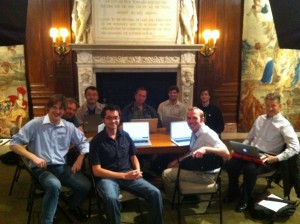The Internet’s Own Boy, the documentary about Aaron Swartz, premieres online and in theaters today. You can watch it on the Internet Archive. From the film’s website
Tag Archives: Community
Rest in peace, Aaron Swartz
Aaron Swartz committed suicide yesterday (Jan 11, 2013).
The Open Library wouldn’t exist without him. He wrote the backbone of the system you see today, hired the team that built the first version of the website.
He founded Demand Progress, which launched the campaign against the Internet censorship bills (SOPA/PIPA), coauthored the RSS 1.0 specification, cofounded the online news site Reddit, among many other good things.
His death is a great loss to all of us. May his soul rest in peace.
KohaCon 2011
Anand and I attended the Koha Conference in Thane, Mumbai earlier in November and spoke about Open Library. The conference took place from Oct 31 till 2 November. There was a hackfest following the event from 4th to 6th.
We missed the first day and presented our talk on the second day of the event. The first day had a number of interesting talks mainly about libraries shifting to Koha and about deployment issues. We spent our free time speaking to Robin Sheat, Dobrica Pavlinu i and Ian Walls among others about ways to tie up the Open Library data along with Koha installations. While the audience was somewhat small, it was truly international. There were folks from Kenya, Nigeria, France, the States, New Zealand, Australia, Croatia and of course various parts of India. We also met Savitra who apart from being a Koha developer, runs a Bangalore based company called OSS labs that provides hosted Koha instances for libraries.
We presented on the last day. Our slides are available at http://internetarchive.github.com/kohacon2011-presentation/. It was an introduction to Open Library, the data we have and some discussions on the API. There were a few questions mainly about copyright issues and about the classification system we use on the website. The conference was attended by many librarians and two of them (The Institute of Management Studies Library at VPM Thane and the University of Zagreb Faculty of Humanities and Social Sciences Library, Croatia) have applied to join the Open Library Lending Library program.
After the presentations, November 3rd was a day off and we spent it wandering around the older parts of Mumbai. On November 4th, we went back and spent the morning brainstorming about ideas to implement. We came up with a few
- Show Open Library as Search Target in “More Searches” in OPAC detail page
- Show OL borrow information and covers on Koha search and detail pages
- Koha should make it easy for librarians to attach covers using Open Library
The first is a simple database update that presents OL as a search option when a book is not found while searching in a Koha installation. It’s been done and signed off.
The second was a simple Javascript change that fetches covers and borrow information from Open Library and then presents it when searches are done on Koha. This has been implemented as well.
The third is the most involved part and we have started work on an API to upload covers to OL which can be used by any external program. We have also started work on an API for Koha to search our records to see if the book being added is already in our database (in which case, it can auto complete the details for them). The search will also return the cover if it exists. On our end, if the koha side agrees, we can populate our database with the catalogue record being searched for and if a cover is uploaded, we can get a copy of that as well. This means that if a Koha instance in one library has uploaded a cover, other libraries will be able to use it. On the Koha side, Robin has a private branch that contains the work in progress. Details are in the bugzilla entry.
We’re following up on the bugs and the lending library requests to join. On the overall, it was a wonderful event and one that benefited Open Library as well as Koha.
BookReader Work Sprint at NYPL Labs
We had a really fantastic code/work sprint for the BookReader organized by the most excellent NYPL Labs. The sprint was designed to bring together organizations that have an interest in the BookReader as a way to foster the sharing of interest, code and expertise.
We started by making a list of desired features and prioritizing them. High on the list was to make the code more modular and easier to understand, reuse and extend. We made great progress towards that goal by creating a new plugin architecture that allows new views of the book to be added cleanly to the existing code. For example, it will be possible to create a book view that uses the <canvas> tag or other advanced web technologies and have it automatically included in the BookReader application simply by including that plugin’s JavaScript file.
Another highly desired feature is making it easier for people to use their own books with the BookReader application. Doug Reside from NYPL Labs contributed a “book loader” (our new term for the piece of code that connects the BookReader to the underlying images and metadata for a book to display) that allows you to specify the images for a book directly inside an HTML file. This new loader provides a simple way to use the BookReader for your own books.
The new code is currently on the codesprint branch of the BookReader github repository. We plan to integrate the new plugin system once the code has been polished and tested. Updated documentation is also coming. You can subscribe to the bookreader-announce mailing list to be notified when the code is released. You can also find more information about developing and using the BookReader in our developer resources.
This works sprint hosted by NYPL Labs marks an exciting new milestone in the development of the BookReader. We’re setting the foundation for greater re-use and collaboration around the BookReader. Many thanks to Doug Reside, David Riordan and Ben Vershbow of NYPL Labs for organizing the sprint and the fantastic attendees who contributed ideas and code commits!
“We’re Re-Tribalising”
“It’s no longer one thing at a time, but everything all at once.”
Happy Birthday, Marshall McLuhan. (Via @josettemelchor on Twitter.)




